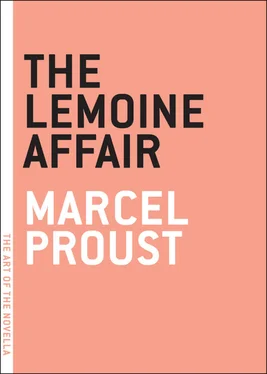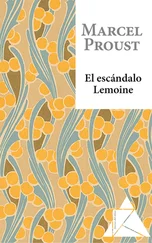The Regent made the very true remark to Mme Standish that she was not wearing her pearls as other ladies did, but in a way that the Queen of England had imitated. Guiche was there; he had been brought there as if on a leash out of fear of incurring the Regent’s displeasure forever, and was not very much at ease being there. He was much happier at the Sorbonne and in the Academies, where he was sought out more than anyone else. But in the end the Regent had reeled him in; he sensed what he owed in respect of birth, if not of person, to the good of the State, perhaps to his own safety; it would have been too conspicuous if he had not come, and since there was no middle ground between disappearing and refusing to come, he came despite himself. At the word “pearls,” I sought him out with my eyes. His own, very similar to his mother’s, were admirable, with a gaze that, although no one liked amusing himself as much as he did, seemed to pierce through his pupils, as soon as his mind was engaged in some serious subject. We have seen that he was a Gramont, his name Aure, of that illustrious house made important by so many marriages and positions ever since Sanche-Garcie d’Aure and Antoine d’Aure, Vicomte d’Aster, who took the name and arms of Gramont. Armand de Gramont, who is in question here, with all the seriousness the other lacked, recalled the graces of that gallant Comte de Guiche, who had been so extensively welcomed in the early years of the reign of Louis XIV. He towered over all the other dukes, if only by his infinite knowledge and his admirable discoveries. I can truthfully say that I would say the same things even if I had not received so many marks of friendship from him. His wife was worthy of him, which is saying quite a lot. The position of this duke was unique. He was the delight of the court, the hope, with good reason, of scholars, the friend, without servility, of the highest people, the protector of choice for those who were not yet elevated, the close friend infinitely regarded by José Maria Sert, who is one of the foremost painters in Europe for his likenesses of faces and his smart, enduring decoration of buildings. It has been remarked in its place how, abandoning my berlin for some mules when I was returning to Madrid for my embassy, I had gone to admire his works in a church where they are arranged with prodigious art, between the row of altar railings and columns inlaid with the most precious marble. The Duc de Guiche was chatting with Ph. de Caraman-Chimay, uncle of the one who had become my son-in-law. Their name is Riquet and he truly resembled Riquet with the Tufted Hair as he is portrayed in the fairytales. Despite that, his face promised charm and delicacy and kept its promises, according to what his friends have told me. But I was not at all used to him — we had no commerce, so to speak — and I speak in these Memoirs only of things I have been able to know for myself. I led the Duc de Guiche into the private gallery so that no one could hear us: “Well!” I said to him, “Has the Regent spoken to you of Le Moine?” “Yes,” he replied smiling, “and for now, despite these cunctations, I think I have persuaded him.” Lest our brief conference be noticed, we had drawn very close to the Regent, and Guiche pointed out to me that they were still talking about gemstones, Standish having explained that in a fire all the diamonds of her mother, Mme de Poix, had burned and turned black, because of which peculiarity, very curious in its effects, they had brought them to the cabinet of the King of England where they were preserved: “But if the diamond was blackened by fire, couldn’t coal be changed into a diamond?” asked the Regent, turning to Guiche with an embarrassed air, who shrugged his shoulders and looked at me, confounded by this bewitchment of a man he had thought already dissuaded.
We saw for the first time at Saint-Cloud the Comte de Fels, whose family name is Frich, who came to pay court to the King of England. These Frichs, although they came long ago from the dregs of society, are very glorious. It is to one of them that the good lady Cornuel replied, as he was having her admire the livery of one of his lackeys and added that it came to him from his grandfather: “Oh really, Monsieur? I had no idea that Monsieur your grandfather was a lackey.” The presence at the parvulo of the Comte de Fels seemed strange to those who can still be surprised; the absence of the Marquis de Castellane surprised them even more. He had worked for more than twenty years, with the success we know, for the rapprochement of France with England where he had made an excellent ambassador, and the instant the King of England came to Saint-Cloud, his name, illustrious in so many respects, was the first one that had come to his mind. We saw at this parvulo another very singular novelty, that of a Prince d’Orléans traveling in France incognito under the very strange name of an Infante of Spain. I expostulated in vain with M. the Duc d’Orléans that, as great as the house from which this prince came was, one could not conceive of calling an Infante of Spain someone who was not so in his own country, where they give that name only to the heir to the crown, as we have seen in the conversation I had with Guelterio during my ambassadorship to Madrid; and more, that it was only a short step from Infante of Spain to simply Infante, and that the former would serve as a shoehorn for the latter. At which M. the Duc d’Orléans protested that one said simply King only for the King of France, that it had been commanded to M. the Duc de Lorraine, his uncle, not to let himself say King of France, when speaking of the King, or else he would never leave Lorraine, and finally that if one said the Pope, with nothing more, it’s because no other name would be needed. I could offer no reply to any of these fine reasonings, but I knew where the Regent’s weakness would lead him, and I made free to tell him. We have seen the result of this, and it wasn’t long before people said simply Infante. The King of Spain’s envoys went to seek him out in Paris and led him to Versailles, where he paid reverence to the King who remained closeted with him for a good hour, then went into the gallery and presented him, where everyone greatly admired his wit. Near the country house of the Prince de Cellamare he visited that of the Comte and Comtesse de Beaumont whither the King of England had already gone. People said with reason that never had husband and wife been so perfectly made for each other, or for them their magnificent and singular home situated on the pathway to the Annonciades, where it seemed to have been waiting for them for a hundred years. He praised the magnificence of the gardens in perfectly chosen and measured terms, and from there went to Saint-Cloud for the parvulo, but made a scandal there by the unbearable pretension of placing his hand on the Regent. The Regent’s weakness made the deliberations reach this highly unprecedented compromise that the Regent and the Infante of Spain entered at the same time, through different doors, into the dining room where the dinner was being given. Thus he hoped to hide his hand. He charmed everyone again with his wit, but did not kiss any of the princesses, but only the Queen of England, which surprised everyone greatly. The King was outraged to learn of the claim on the royal hand and that the Regent’s weakness had allowed the plot to be hatched. He did not admit the title of Infante and declared that that prince would be received only with his former rank, immediately after the Duc du Maine. The Infante of Spain tried to reach his goal by other ways. They did not succeed in the least. He stopped visiting the King other than through lingering habit, and at that only irregularly. In the end he suffered from weariness and was seen only rarely at Versailles, where his absence made itself strongly felt, and awoke regret that he had not settled there. But this digression on the peculiarity of titles has taken us too far astray from the Le Moine affair.
Читать дальше



![Marcel Proust - In Search of Lost Time [volumes 1 to 7]](/books/579170/marcel-proust-in-search-of-lost-time-volumes-1-to-thumb.webp)








